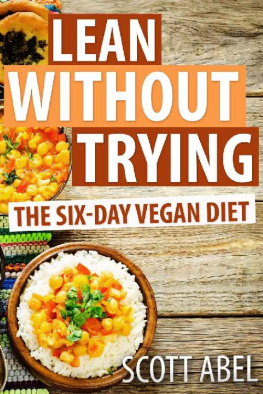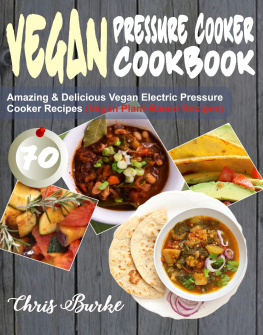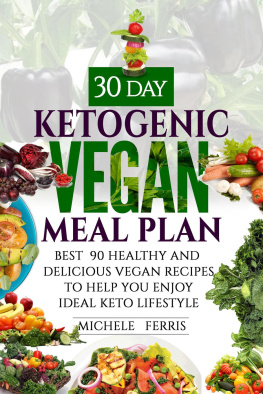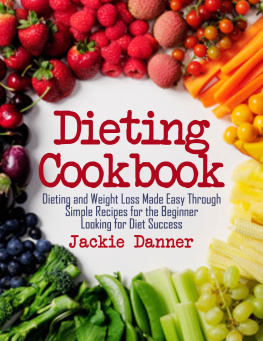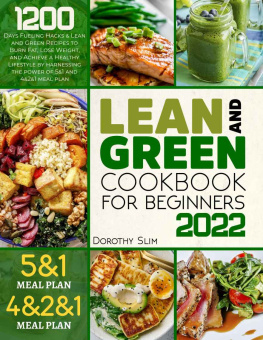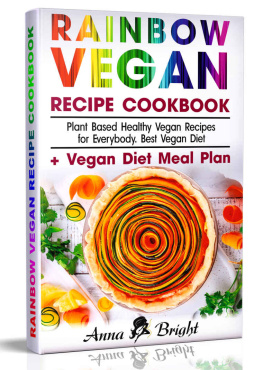Lean Without Trying
Scott Abel
Edited by Perry Mykleby
Free Gift
This book includes twenty-five recipes to get you started. However, ebooks arent always the best medium for practical recipes not if you want to scribble on them, take notes and tweak them.
So, you can go get a printable version of all the recipes in this book here:
https://scottabelfitness.com/recipes
We also have a growing community on Facebook of folks sharing recipes, support, successes and challenges. Check out the link above for more information on it.
TABLEOFCONTENTS
Meal Plans
Recipes
Regular Diet Day Recipes
Cheat Day Recipes
Dressings, Sauces and Gravies
INTRODUCTION
It has been a long, long time since anything in the diet and fitness industry really excited me. Between 2005 to 2008, I created my Metabolic Enhancement Training (MET) methodology by combining traditional bodybuilding training with functional training and Olympic lift variations. That was exhilarating, but Im much more excited by the tectonic shifts in nutritional knowledge going on all around us.
Im enthralled by the work of so many respected academics and researchers who accumulated and organized nutrition research, drawing conclusions that now seem obvious: plant-based diet is truly the best diet strategy to follow. (Mann, J. 2009, Clarys, P. et al, 2014, Greger, M, 2015). Based on the overwhelming research into whole food, plant-based eating, I adopted a vegan diet myself. Suddenly everything has changed. It was like a hard right-hand turn after driving a straight road for years.
I undertook this project in response to the overwhelming interest Ive received in the plant-based/vegan diet lifestyle. This is not some new diet fad or vogue trend.
The 6-Day Vegan Diet addresses the cosmetic, health and weight-control benefits of adapting a vegan lifestyle, for at least 6 days per week that is.
When I first announced that I was breaking vegan, many of my clients and followers wanted to do the same. Some had already begun plant-based eating on their own. Almost immediately people started asking me to write a book about how to go vegan.
Frankly, I didnt quite feel qualified at the time. Maybe Im still not. To be sure, there were, and are so many nutrition experts who have been living a vegan lifestyle much longer than I have. But I dug in, did my homework, and I honed my vegan diet consistent with what I already knew about metabolism.
Im glad I waited to write this book. As time went on, I experienced first-hand many of the physiological, metabolic, cosmetic, and other changes Im now able to write about.
I havent found the how to be all that complicated. Like normal omnivore diet strategy, plant-based diet strategy is as complicated as people make it when it doesnt need to be.
At one point, I considered renaming this project Lean for Life because the longer you follow a plant-based diet strategy, the easier weight-control seems to be. For health, longevity, weight-loss, long-term weight control, and overall well-beingif you truly desire to be lean for lifethen a plant-based diet makes the most sense. As Dr. Pamela Popper said in the documentary Food Choices, If there is a one size fits all diet out there, it would be the whole food plant-based diet.
Most people in the fitness industry seem to be more concerned with the cosmetic effects of a particular diet more than its overall health effects. Ironically, the research is clear about the cosmetic (i.e., fat loss) benefits a plant-based vegan diet (Greger, 2015).
Vegans have the lowest body mass indices, BMIs (Spencer, E.A, 2003), which has more to do with what they are not eating than what they are eating. The research shows repeatedly that the people who consume the most animal products tend to have the most body composition and weight control issues.
Following loss of unhealthy body fat, other health indicators also tend to improve. Blood pressure, blood sugar and lipid profiles improve. Health risks for various cancers and other disease decline. Many of my own clients who previously had health issues requiring medication have been taken completely off their anti-hypertensive, statin, or diabetes meds since adopting the 6-Day Vegan Diet.
In this book, I will share simple ways to eat vegan 6 days per week, why we suggest that approach, and whats involved. It includes easy-to-prepare recipes for those of you interested in that sort of thing. But the primary purpose of this project was to develop a simple eating plan that serves the body.
For as long as I have been coaching, I have always lectured that a sound diet strategy must do two things: it must first be sustainable, and it must also serve the body.
People I respect dont like the term vegan because theyre concerned that it portrays others as unethical if they choose to not consume animal products. I choose to use the term because Im concerned about the planet, and am bothered by animal slaughter. So even if you break vegan for cosmetic reasons alone, and even for just 6 days per week, eating this way has been shown to deliver the most health benefits.
Staying true to my other projects regarding diet and metabolism, the 6-Day Vegan Diet includes nothing about macros or counting calories. Its about eating vegan, at least 6 days per week.
Lets get started.
CHAPTER ONE
A Note on Terminology: Vegan Diet vs. Vegan Identity
For starters, when I refer to the 6-Day Vegan Diet, I am referring to food choices and only food choices, at least for now. This means I am referring to a diet strategy that, for 6 days a week, excludes consumption of all animal products. The 7th day of the week is about eating freely, any foods you want, as much as you want.
Now this prescription alone would make some vegans heads explode. For some people who identify as vegan the term goes well beyond diet strategy. Capital V Vegans are people who wont wear leather products and who would never ever consider the option of eating non-vegan foods, ever. They are absolutists. Discussing these elements of veganism would distract us from the nitty gritty details of the 6-Day Vegan Diet Strategy. But I do feel I need to at least address some fundamentals here.
On my end, technically you could argue that the term flexitarian is more appropriate for someone who follows a vegan diet strategy 6 days per week, but with no restrictions on animal products for the 7th day. This is true. Flexitarian is defined as eating a mostly vegetarian diet with occasional animal-based products. But this term lacks precision for me in terms of timing that flexibility. The difference in my 6-Day Vegan Diet approach is that it is not flexible on those 6 days per week. There is more structure associated with the 6-Day Vegan diet strategy approach than the term flexitarian implies. Flexitarian is more descriptive than it is instructional, and the 6-Day Vegan Diet is meant to be instructional.
This brings up another issue: labels. There are just far too many labels in the nutrition world that become identities. People are now ridiculously retreating into nutrition identity camps, almost like political or religious affiliations. This creates an unfortunate us versus them tribal mentality among consumers. I am trying to stick mostly to defining only the diet strategy as vegan while staying out of esoteric arguments on the ethical, moral, and political elements. There are some relevant, salient points on these matters that bear discussion, even in a project like this one that is meant to be about diet strategy specifically and not about moral high ground.
Next page
